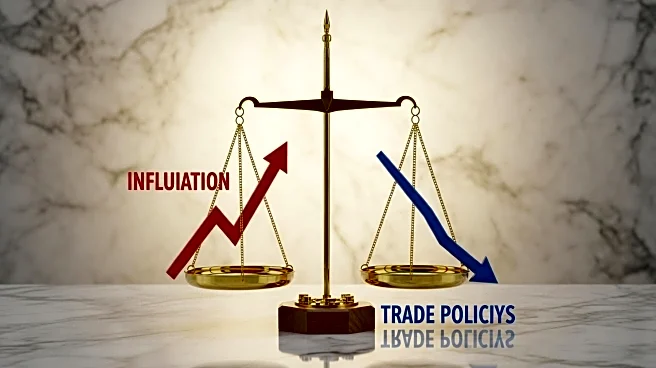What's Happening?
JPMorgan Chase CEO Jamie Dimon has expressed concerns about the possibility of a U.S. economic recession, potentially occurring as early as 2026. In a recent interview, Dimon highlighted several factors contributing to this risk, including government spending, inflation, and President Trump's trade policies. Dimon noted a 30 percent chance of a stock market correction within the next six months to two years, driven by geopolitical issues and tariff policies. He emphasized the uncertainty surrounding these economic conditions and criticized the ongoing government shutdown, describing it as a 'bad idea' regardless of political affiliation.
Why It's Important?
Dimon's warning is significant as it comes from one of Wall Street's most influential figures, potentially impacting investor confidence and market stability. His concerns about inflation and trade policies could influence public policy discussions and economic strategies. The potential recession could affect various sectors, including finance, manufacturing, and consumer goods, leading to job losses and decreased economic growth. Dimon's remarks may prompt businesses and policymakers to reassess their strategies to mitigate these risks, emphasizing the need for careful economic planning and policy adjustments.
What's Next?
Dimon has been meeting privately with President Trump and other government officials to discuss his concerns, including tariffs and Federal Reserve rates. These discussions may lead to policy changes or adjustments aimed at stabilizing the economy. Stakeholders, including businesses and policymakers, will likely monitor economic indicators closely and consider strategic responses to Dimon's warnings. The potential for a recession may drive increased scrutiny of government spending and trade policies, influencing future legislative and economic decisions.
Beyond the Headlines
Dimon's concerns highlight the broader implications of trade policies and government spending on economic stability. The potential recession underscores the interconnectedness of global markets and the impact of geopolitical tensions on domestic economies. This situation may lead to increased debate over the role of government intervention in economic affairs and the balance between free trade and protectionism. Long-term shifts in economic policy could emerge as stakeholders seek to address these challenges and prevent future economic downturns.











